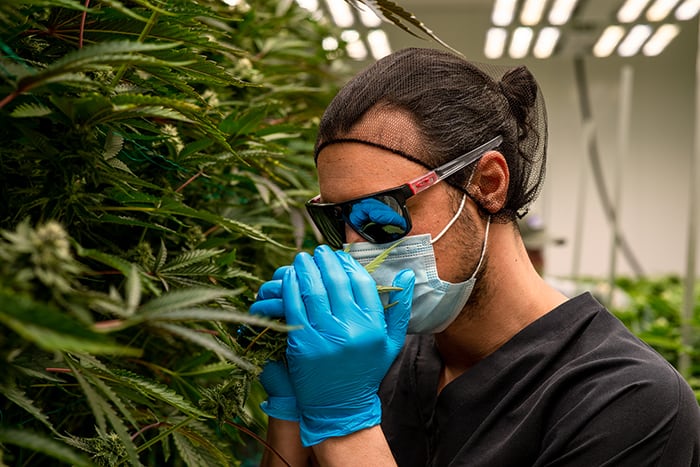Today is International Women’s Day—an opportunity to celebrate women have chosen to challenge the status quo, helping break down barriers for themselves and others. It’s also a moment where we look toward the future with hope for all the more we can achieve for women around the world by working together.
Each year on March 8, we honor this tradition by highlighting the women of Cannabis Conference, an impressive roster of women shattering glass ceilings, making space for themselves and other notable women in the burgeoning cannabis industry.
This listing is just a start. As we continue to announce speakers for Cannabis Conference (Aug. 24-26, 2021, at the Paris Las Vegas Hotel & Casino), there will be plenty more women innovators, leaders, entrepreneurs and trailblazers to highlight—so keep an eye on CannabisConference.com for continued updates to our speaker roster.

Bennett
Theresa Bennett
Editor, Hemp Grower
Theresa Bennett is editor of Hemp Grower. She joined HG and Cannabis Business Times as associate editor in November 2019 after working for GIE Media’s Recycling Group of magazines. Prior to her time with GIE, Bennett was the K-12 education reporter for the Akron Beacon Journal. Bennett is also a freelance writer whose work has appeared in Modern Farmer and newspapers across the country.

Boyajian
Salpy Boyajian
Executive Vice President / Board Chairman, Flower One
Salpy Boyajian joined Flower One in October of 2018 following the acquisition of NLV Organics (NLVO), a renowned consumer brand and luxury cultivator she co-founded in 2014. Boyajian now serves as the company’s Executive Vice President and Board Chairman, having previously held the title of Chief Operating Officer. Before entering the cannabis space, she served as the Mental Health Director for several leading non-profits in Los Angeles, ultimately founding her own non-profit organization before relocating to Nevada.

Goldsberry
Debby Goldsberry
Executive Director, Magnolia Wellness, FLOR
Co-Founder, Berkeley Patients Group collective
Debby Goldsberry is executive director at Magnolia Wellness, an award-winning dispensary in Oakland, Calif., and the managing director of the Berkeley Community Care Center dispensary at Amoeba Music. She co-founded the Berkeley Patients Group (BPG) medical cannabis collective in 1999, directing its growth for more than 11 years. In 2017, Goldsberry published her first book, “Idiot’s Guide: Starting and Running a Marijuana Business.”

Kowalski
Emily Kowalski
Vice President of Cultivation, LeafLine Labs
Emily Kowalski is the Vice President of Cultivation at LeafLine Labs, LLC, one of two medical cannabis companies serving the patients of Minnesota. She utilizes her 10-plus years of experience in propagation, greenhouse production, and outdoor nursery production to cultivate consistent, healthy cannabis in LeafLine’s state-of-the-art indoor facility. Kowalski never settles for status quo and digs deep into data to drive quality and efficiency within her operation.

Neiden Tomaselli
Cassie Neiden Tomaselli
Conference Programming Director, Cannabis Conference
Contributing Editor, Cannabis Business Times, Cannabis Dispensary and Hemp Grower
Cassie Neiden Tomaselli is a media professional with 10+ years’ experience generating print, web, video and podcast content for both trade and consumer markets. She now serves as Conference Programming Director for Cannabis Conference, where she works with the event’s Advisory Board and editorial teams from Cannabis Business Times, Cannabis Dispensary and Hemp Grower to craft high-quality education for industry events. Previously, Neiden Tomaselli served as Director of Marketing & Communications for Firelands Scientific, an Ohio-based medical cannabis company.

Ratliff
Alisia Ratliff, PMP
Chief Executive Officer & Founder, Victus Capital Ventures, LLC
Alisia Ratliff, the CEO of Victus Capital Ventures and licensed project management professional, is a technical conference speaker, esteemed author, and ambitious entrepreneur. Possessing over 14 years of leadership experience expanding over several industries—Ratliff effectively manages technical and executive teams cross-departmentally while simultaneously overseeing all business operations, including supply chain, manufacturing, laboratory operations and product formulation. Ratliff helps her clients avoid repeating failed business models and implement sustainable business strategies no matter the ever-changing regulatory environment.

Ruscitto
Andriana Ruscitto
Assistant Editor, Cannabis Business Times, Cannabis Dispensary, Hemp Grower
Andriana Ruscitto was hired as an associate editor for Cannabis Business Times, Cannabis Dispensary and Hemp Grower in January 2021. Before joining GIE, Ruscitto attended Kent State University, where she worked in the university communications and marketing department, writing stories for the Kent State Today.

Schiller
Melissa Schiller
Senior Digital Editor, Cannabis Business Times & Cannabis Dispensary
Melissa Schiller joined the Cannabis Business Times team as an Assistant Digital Editor in June 2017 and now serves as Senior Digital Editor. Previously, she worked as an Audience Development Associate for GIE Media’s Ornamental Group of publications, where she managed the circulation for Cannabis Business Times, Garden Center, Nursery Management, and Greenhouse Management. She has also worked as a contributing writer and editorial assistant for a community newspaper and as a freelance writer for Northeast Ohio Media Group and Modern Tire Dealer.

Shreeve
Anna Shreeve
President, Urban Paragon, Inc., Targeted Intent, Inc., and The Bakeréé
Anna Shreeve is President of Urban Paragon, Inc., Targeted Intent, Inc., and The Bakeréé. Shreeve entered the medical cannabis industry seven years ago with her son, and she and her team opened The Baker, a division of Cookie Fam Genetics, a collaboration with legendary breeder “Jigga.” Shreeve’s group holds two recreational producer/processor licenses in Washington, and a recreational retail/processor license in Oregon.

Simakis
Michelle Simakis
Editor, Cannabis Business Times
Michelle Simakis is editor of Cannabis Business Times. She joined GIE Media in 2012 and most recently served as editor of Garden Center magazine, the leading trade publication covering the independent garden retail market. Under her direction, Garden Center expanded its Top 100 Independent Garden Centers List by devoting an entire issue to telling the stories of the leaders and companies ranked on the list. She also helped to launch the Garden Center Executive Summit, the educational conference for key-decision makers in the industry, and recently developed a the only daily e-newsletter in the market.

Skodzinski
Noelle Skodzinski
Editorial Director, Cannabis Business Times, Cannabis Dispensary, Hemp Grower, Cannabis Conference
Noelle Skodzinski has 25+ years of publishing experience. She co-founded Cannabis Business Times with previous owner Tim Hermes in 2014. She has been named among the Top 50 Most Influential Women in Cannabis. Previously, she held numerous editorial leadership roles, including serving as editorial director of the Publishing Group at North American Publishing Co., where she oversaw two national business magazines, all digital content products, as well as the annual Publishing Business Conference and related events. In 2018 and 2020, Skodzinski was named one of the “Top Women in Media” by Folio.

Wiseman
Hope Wiseman
Owner, Mary & Main Dispensary
Born and raised in Prince George’s County, Md., Hope Wiseman has always been passionate about serving her community. After spending a year at SunTrust as an Equity Institutional Sales Analyst, Wiseman decided to continue striving for excellence by pursuing her dreams of entrepreneurship. In Fall 2017, Wiseman became the youngest Black woman dispensary owner in the United States with the opening of Mary & Main dispensary in Prince George’s County, Maryland. She has been featured in Black Enterprise, Huffington Post, Blavity, and Cannabis Dispensary. Wiseman is also a speaker and consultant to those looking to enter the industry.






